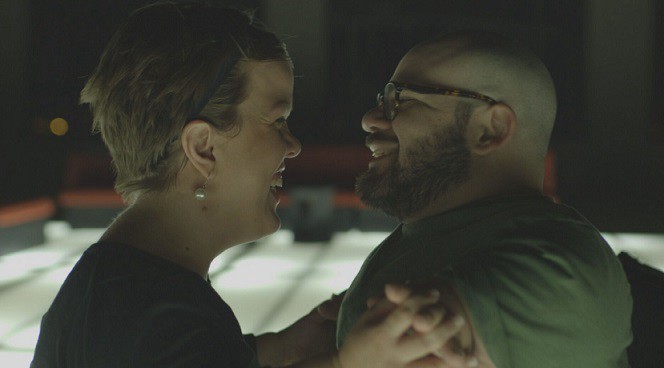Inspired by Andrew Solomon’s best-selling novel and perhaps a quote the begins Roger Ebert’s autobiography Life Itself (“…movies are like a machine that generates empathy”), Rachel Dretzin’s Far from the Tree tells seven distinct stories of families and individuals grappling with disability, emotional trauma, and, ultimately, how to be happy. The film explores new stories inspired by those documented by Solomon, who grew up obsessed with Emily Dickens and opera. He went through attempts to cure himself of gay attractions via sexual surrogacy, eventually coming out, leading to marriage and an unconventional family situation. (His extended LGBT family includes six parents of four children.)
Some of these passages could inspire their own engaging feature film, including the stories of Loini, Leah, and Joe, three little people who come together at an annual conference. Loini searches for love, meaning, and her place in the world while Joe and Leah find each other, get married, and set out to have a child. Leah is an advocate in the community concerned with a new experimental trial to end dwarfism. The film confronts a core question in many of its cultural, economic, and geographically disjointed passages: what should be cured and what should be celebrated.
The film’s darkest story follows the parents of Trevor, a seemingly normal, all-American 16-year-old boy who wakes up one morning and slits the throat of an 8-year-old. They, along with medical professionals, struggle to make sense of the murder as they move on, often choosing to talk instead about Trevor’s two younger siblings. Trevor looms as a specter over the family as they move from suburban New Orleans to Texas, keeping in contact through video and phone calls, as if their son is away at college.

Other stories have been told in better documentaries, including Aspie Seeks Love and Life, Animated, as a family of means struggles with children on the autistic spectrum. Jason, born with Down syndrome, along with Solomon, are the only subjects chronicled in both Dretzin’s film and his book. Jason was a life-long activist, beating the odds given by his doctors as he becomes an ambassador for the community appearing on Sesame Street and in marketing materials celebrating his disability. He offers a long view on his life and disability in a goose bump-inducing monologue that ends his story.
The film’s most painful story to tell is that of Jack, a severely autistic boy who is brilliant despite having difficulty communicating. His parents try anything and everything to reverse his symptoms when noticed and he continues to regress. It reaches a point where he’s able to communicate through a letter board, saying “I’m smart and I’m trying” when tested in a clinical setting. He eventually finds a group of friends and succeeds with the help of a facilitator.
Dretzin’s Far from the Tree beautifully interweaves stories that are stronger than others. Edited by Ben Gold, it’s a film with an inspiring message that’s often uneven despite the coherence of its message guided by Solomon. As affirming and enlightening as the experience is, it does suffer from the trappings of flying into these characters lives and popping out rather than spending a considerable amount of time in their shoes. Without the context offered by Solomon, the film would not escape it’s cable reality TV-like framing.
Far from the Tree screened at the Montclair Film Festival and will be released by Sundance Selects.

